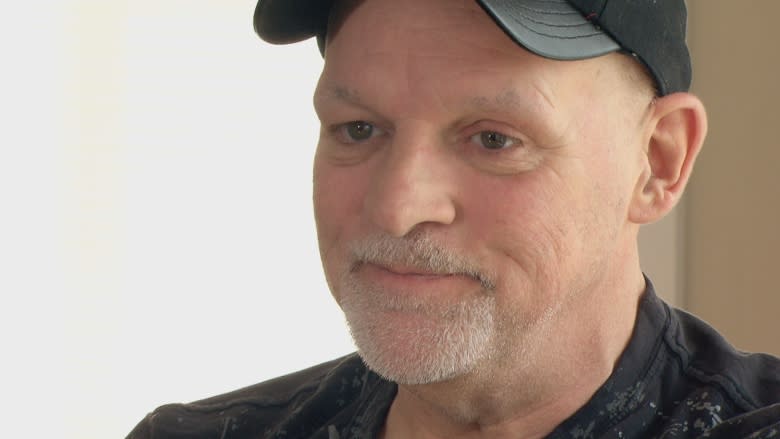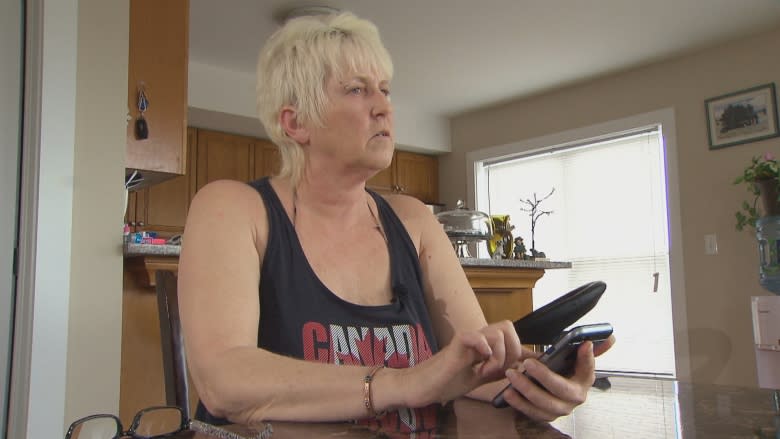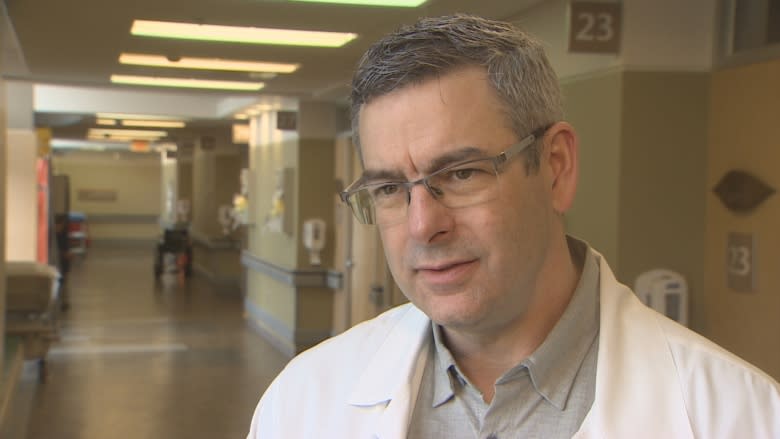On the night he nearly died, this man resorted to leaving the ER to call 911 for help
David Doucette says he would be dead if he hadn't resorted to leaving a Halifax emergency room last July following repeated attempts to be admitted, and then called 911 in a desperate search for medical help.
Only hours after he was returned to hospital by ambulance, the Halifax man was diagnosed with Stage 4 non-Hodgkins lymphoma. There was doubt he would survive the night. His hematologist described him as the sickest patient she's ever seen survive.
"I guess it wasn't my time yet," said Doucette, 52. "To me, being from here, it's unacceptable. And I'm sure every Nova Scotian would say the same thing."
Political critics and Doctors Nova Scotia have warned repeatedly that some patients could fall through the cracks because of the doctor shortage in Nova Scotia.
Doucette believes he's one of those cases. He's using his incredible tale of survival to put a face on what he calls Nova Scotia's health-care crisis.
He is angry with how he was handled at the ER of the Halifax Infirmary and also believes his cancer could have been detected sooner if only he'd had a family doctor.
4 trips to ER
On Monday, the provincial government announced nearly $40 million for physician raises and other incentives in an effort to recruit and retain more doctors.
But Doucette wants politicians to know their decisions about whether or not to invest in doctors and health care aren't just affecting statistics, but people.
His medical problems began last summer when he found a marble-sized lump under his left arm and he fell repeatedly after taking a shower.
His girlfriend, Kelly Steeves, took him to the emergency department at the Halifax Infirmary. It was the first of four visits, she said, where she fought for the hospital to admit him.
She said on the second visit, a physician at the emergency department ordered a biopsy of the lump. They were told to wait a couple of weeks for the results and sent home.
Doucette did not have a family doctor to consult as an alternative and felt too ill to go to a walk-in clinic.
"We waited and waited and he wasn't getting any better," Steeves said. "I said, 'We've gotta go back.'"
Steeves took him to hospital, but again she said he was not admitted. Infuriated, the next day they returned. At this point, Doucette said he could barely stand and the left side of his body had ballooned.
"I actually got up and knocked on the room doors that were closed in the hallway there and there were patients lined up in their beds with the ambulance people and the nurse came out and she said, 'What is your problem?'
"I said, 'Look at me! There's something wrong!'"
'He's fading fast'
Steeves readily admits she used foul language when trying to get the attention of staff as they waited.
"He couldn't really sit so he started laying down on a bench. I said, 'That's it. He needs to see a doctor. He's fading fast here.'"
Steeves got Doucette into their truck. She said they left the hospital and drove to a nearby shopping centre. Steeves called 911 and paramedics took Doucette back to hospital.
The difference, this time, was that paramedics monitored his vitals and he was able to lie on a stretcher instead of a bench.
"God bless her," Doucette said of his girlfriend's actions. "She should have never had to do that. But she did ... It's unbelievable the things she did for me, and she persisted."
That night, he was admitted and moved to the care of the Victoria General hospital.
Doucette's hematologist, Dr. Wanda Hasegawa, spoke to CBC News with her patient's permission. She said his biopsy tests arrived that night, revealing he had lymphoma. Her patient was so full of cancer, it is easier to list the organs that were not affected, she said.
Doucette's fight for help didn't end there. During the four months he spent being treated in hospital, the palliative care department took on the role of family doctor when dealing with other aspects of his care.
Outside the hospital, Steeves begged medical clinics to take her boyfriend on as a patient, even going so far as to post a plea for help finding a family physician on the classified website Kijiji.
"I was desperate," she said. "I've called the line that you're supposed to call to put yourself on a list for a doctor. I called them and spoke to them and they said that's a year or two-year wait for a doctor.
"Well, he doesn't have that. I've told them that, that he doesn't have time for that."
In the years leading up to his cancer diagnosis, Doucette said he tried to get a family doctor. He depended on walk-in clinics and occasional visits to other doctors to refill his prescriptions.
Hasegawa said the lack of a family doctor could have been a factor in Doucette's diagnosis. While it is possible his cancer developed over the course of a short period of time, she has no benchmark — no blood work to refer back to.
Doucette is not her only patient without a family doctor, something she said complicates their cases.
Hasegawa would not comment on whether or not Doucette should have been admitted during his earlier visits to the emergency department.
She said the biopsy results are the only way to diagnose and that patients are commonly sent home while they wait.
Dr. Kirk Magee, the interim zone chief for the central zone of Nova Scotia's Health Authority, said after reviewing Doucette's file, he's confident the patient received the best care the hospital could give.
For privacy reasons, Magee said he is limited in giving details on the case, but spoke of the role of the emergency department.
"Investigations are done to look for problems that are acute in nature," he said.
"We provide treatment for acute problems, investigations for acute problems and if we don't find an acute cause, then we often refer them for follow up with their family doctor or with other health-care professionals."
He said the reality is, when patients don't have a family physician, it makes it very difficult to arrange the appropriate follow-up care.
"Oftentimes what we will do is we will speak with specialists in different disciplines to see if they will follow up on the patient's care or the patient's needed tests, but it's not an easy solution," he said.
Doucette found out on Tuesday that he's in remission — a remarkable development, even by Hasegawa's standards.
But he said it's time more patients put a face on the doctor-shortage issue and fight back.
"It's too bad that we had to do what we had to do," he said. "People out there looking for doctors who really need them, that is unacceptable. What is wrong with the government that they can't bring doctors in here?"
Doucette said his medical team at the Victoria General was remarkable. They've since found a family doctor who has taken him on as a patient.
"They were sure I was dead the first night," he said. "If you go through what I went through, don't give up. If you're fortunate enough to get to that hospital, don't give up. Keep it in your head and your heart that you're going to beat it."




